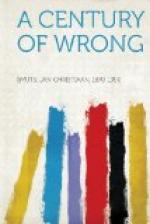A new Governor, Sir George Cathcart, was sent out with two Special Commissioners to give effect to the new policy. A new Treaty between England and the Free State was signed, by which full independence was guaranteed to the Republic, the British Government undertaking at the same time not to interfere with any of the Native tribes north of the Orange River.
As Cathcart remarked in his letters—the Sovereignty bubble had burst, and the silly Sovereignty farce was played out.
[Sidenote: The Diamond Fields]
[17] It must not be forgotten that as long as the Free State was English territory it was supposed to include that strip of ground now known as Kimberley and the Diamond Fields; English title deeds had been issued during the Orange River Sovereignty in respect of the ground in question, which was considered to belong to the Sovereignty, and to be under the jurisdiction of one of the Sovereignty Magistrates. At the reestablishment of the Free State it consequently became a part of the Orange Free State.
[Sidenote: The Basutos.]
Not fifteen years had elapsed since the Convention between England and the Free State before it was broken by the English. It had been solemnly stipulated that England would not interfere in Native affairs north of the Orange River. The Basutos had murdered the Freestaters, plundered them, ravished their wives, and committed endless acts of violence. After a bitter struggle of three years, the Freestaters had succeeded in inflicting a well-merited chastisement on the Basutos, when the British intervened in 1869 in favour of the Natives, notwithstanding the fact that they had reiterated their declaration of non-interference in the Aliwal Convention.
[Sidenote: The Diamond Fields.]
[18] To return to the Diamond Fields, as Froude remarks: “The ink on the Treaty of Aliwal was scarcely dry when diamonds were discovered in large quantities in a district which we had ourselves treated as part of the Orange Territory.” Instead of honestly saying that the British Government relied on its superior strength, and on this ground demanded the territory in question, which contained the richest diamond fields in the world, it hypocritically pretended that the real reason of its depriving the Free State of the Diamond Fields was that they belonged to a Native, notwithstanding the fact that this contention was falsified by the judgment of the English Courts. [19] “There was a notion also,” says Froude, “that the finest diamond mine in the world ought not to be lost to the British Empire.”
The ground was thereupon taken from the Boers, and “from that day no Boer in South Africa has been able to trust to English promises.”
Later, when Brand went to England, the British Government acknowledged its guilt and paid L90,000 for the richest diamond fields in the world, a sum which scarcely represents the daily output of the mines.




